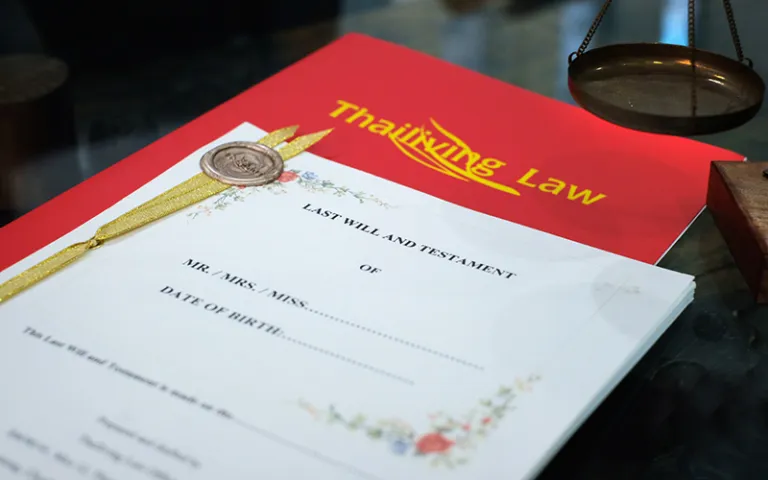THAILIVING LAW
FAMILY LAW & ESTATES AND WILLS

Family Law
FAMILY LAW in Thailand is primarily codified in the Civil and Commercial Code.
The legal system of Family Law in Thailand is based on the European Civil Law system with main influences from the French Civil Law. In Civil Law the general rule is codified and works from the top general written law down.
Thai law is not made by judges or by judicial decisions based on custom and precedent (as in common law), but in practice it is impossible to understand Civil Law without also considering relevant decisions of courts. In practice it is often difficult to understand the specifics of written laws without also considering previous court rulings and relevant Supreme Court judgments and opinions on specific sections or elements of the law applied.
A court or judge can in any case not rule in conflict with the Civil and Commercial Code. The main collection of Family Laws Thailand can be found in the Civil and Commercial Code (Book 5). Below the relevant section of the Thailand Civil and Commercial Code with links to relevant family law related sections.
Family law covers areas like marriage, divorce, property of husband and wife, adoption, parentage, succession. The core collection of family laws in Thailand can be found in Book 5 of the Thailand civil code. Book 5 of the civil code is
intended to deal with all areas of Family Law in Thailand systematically and comprehensively. Book 6 of the civil code deals with succession and inheritance.
Civil and commercial code Family law in Thailand is codified and not made by judges, but courts and independent judges do have some freedom in the interpretation of words and sections of the civil code, unless the supreme court of Thailand (the highest court) has given specific rules for the interpretation or determined the exact (legal) meaning of words and sections applied. Supreme court judgement has binding authority and explain the meaning of certain elements, sections, or words of written laws.
This means that under Thai law marriage is in the first place governed by the civil code and to understand the legal responsibilities of husband and wife and financial consequences of being formally married in Thailand one should read the relevant sections in the civil code but note that certain principles and sections of the civil code could be further specified or explained by the supreme court of Thailand. For example, prenuptial agreements are recognized and enforceable under Thai law (book 5, title 1, chapter 4 ‘property of husband and wife’), however the law (section 1465) also stipulates that the content of a prenuptial cannot contain clauses contrary public order or good morals. What ‘contrary public order and good morals’ exactly means is not specified in the civil code and independent judges can set aside certain clauses in the prenuptial agreement and consider them void pursuant section 1465 second paragraph (as against good morals or public order), but, if any, they must take into account previous supreme court opinions and judgments on the second paragraph of section 1465 civil code.
Last Will and Testaments
The most common last will and testament in Thailand is a last will in writing, dated at the time of making and signed by the testator in the presence of at least 2 witnesses who sign their names to certify the signature of the testator (section 1656 of the Civil and Commercial Code).
The most common last will and testament in Thailand is a last will in writing, dated at the time of making and signed by the testator in the presence of at least 2 witnesses who sign their names to certify the signature of the testator (section 1656 of the Civil and Commercial Code). It is not required that such a will is notarized or registered for it to be a valid legal will.
A last will in Thailand can also be made as a public document at the local amphur (or in Bangkok these local public offices are called Khet), by a declaration to the relevant public officer. The testators must declare his wishe (in Thai) to public officer who in his turn must write down the testator’s declaration in the will in Thai (section 1658 of the Civil and Commercial Code). The official must again read it to the testator and witnesses who following must sign the last will draw up by the public officer. One requirement for such a will is that you must be able to read and write Thai.
A last will can be made at the same amphur by a secret document. The testator in this case must close the document (his last will), sign it and hand it over to the same official (section 1660 of the Civil and Commercial Code). Two witnesses must also sign the closed document and the official will seal the closed last will and testament.
A person may under Thai law in certain cases, i.e., exceptional circumstances such as imminent danger of death and where the person is prevented of making his will in any of the other forms a prescribed in Chapter II sections 1655 to 1672 of the Civil and Commercial Code, make a valid will by word of mouth only.
A person under Thai law may also make a holographic testament, i.e., a testament written wholly by the testator himself, including the date of writing and signature of the testator (section 1657 Civil and Commercial Code).
The information contained on our website is for general information purposes only and does not constitute legal advice.- All rights reserved Thailandlawonline

